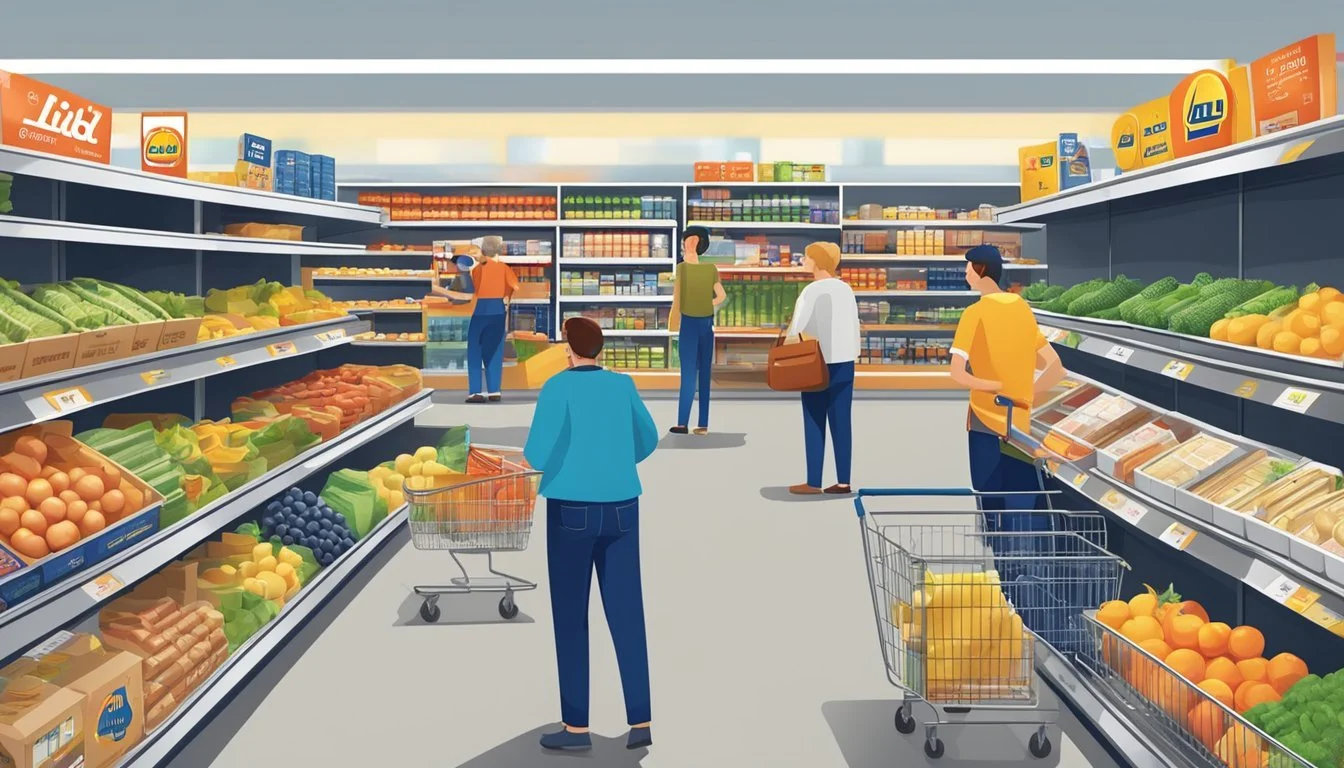Aldi vs Lidl
Comparing Store Offerings, Prices, and Quality
In the competitive landscape of discount grocers, Aldi and Lidl stand out as leading contenders. Both European-based chains have carved out a strong presence, particularly known for their low prices and private-label products. Shoppers often debate the merits of each, as choosing where to fill one's cart can impact both the wallet and the quality of items on the dinner table. While Aldi has been a longstanding name with a robust number of locations in the marketplace, Lidl has been catching up, enticing customers with its own range of budget-friendly goods.
The heart of the Aldi versus Lidl debate tends to revolve around product selection, pricing, and shopping experience. Aldi, known for its cost-saving measures and no-frills shopping environment, streamlines operations to focus on a selection of staple items. This efficiency often results in lower prices but can mean a more limited assortment and a noisier environment. On the other hand, Lidl offers a slightly more expansive selection, including a variety of non-staple items, which appeals to those looking for a one-stop shopping experience.
Differences also emerge in specific departments such as fresh produce, where Lidl frequently promotes deals and a diverse assortment, possibly tipping the scale for freshness-focused shoppers. Both grocers, however, have their own loyalists who prefer one store's offerings over the other. Pinpointing which store is 'better' largely depends on individual shopping preferences, what products are on the shopping list, and the value placed on convenience versus cost savings.
History and Background
Aldi and Lidl are both prominent supermarket chains originating from Germany, having established a significant presence in the global grocery market. They are renowned for their discount prices and have expanded their reach to various countries, impacting consumer shopping habits.
Aldi's Origins and Growth
Aldi, short for "Albrecht Diskont," started as a small food store in the suburbs of Essen, Germany in 1946, founded by brothers Karl and Theo Albrecht. The Albrecht family's business model centered on low prices and a limited selection of goods. This approach swiftly led to Aldi's success and growth within Germany.
By 1960, Aldi had over 300 stores in West Germany. The brand split into Aldi Nord and Aldi Süd due to differing expansion strategies between the brothers, which allowed them to cover more ground without competition between their stores. Aldi Süd is the division that expanded internationally and operates the stores in countries like Australia, the United Kingdom, and the United States. In recent years, Aldi has seen robust growth on the East Coast of the United States.
Lidl's Expansion and Strategy
Lidl began its operations in 1973 when Josef Schwarz established the first store, building upon his fruit wholesale company. Schwarz pursued an aggressive expansion strategy, both in Germany and internationally, which contributed to the chain's substantial growth and popularity.
Lidl made its mark with its "Lidl Surprise" model, providing a constantly changing assortment of non-grocery items. Expansion efforts saw the chain overtaking new markets across Europe, including Italy and Austria. Unlike Aldi, Lidl waited until 2017 to cross the Atlantic and begin opening stores on the East Coast of the United States, seeking to replicate its European success.
Store Layout and Shopping Atmosphere
When it comes to the shopping experiences at Aldi and Lidl, customers may note differences in store designs and the use of space that could affect their shopping journey. Both retailers focus on efficiency but adopt distinct strategies to enhance customer flow and store atmosphere.
Aldi's Store Design and Customer Flow
Aldi stores are characteristically straightforward with a no-frills layout, aimed at a quick and efficient shopping experience. Aisle organization at Aldi is designed to guide customers through the store along a predefined path, leading them past a selection of products curated for economical shopping. This offers customers a predictable, although sometimes limited, range of products with distinct sections for groceries, fresh produce, and seasonal items. The store's square footage is typically smaller than traditional supermarkets, which contributes to an environment that may feel more utilitarian and focused on rapid shopping trips rather than leisurely browsing.
Lidl's Space Utilization and Ambience
Lidl takes a different approach to their store layout, often providing a more spacious shopping environment. Their use of space tends to enhance the shopping atmosphere, creating a balance between efficiency and comfort. The store layout includes wider aisles and a more segmented organization of goods, which can improve the overall ambience and make it feel less rushed. Lidl's design allows for special sections that may offer a wider variety of goods, encompassing not only food items but also non-food options, which can cater to those looking for a broader shopping experience within one location.
Product Selection and Exclusivity
Both Aldi and Lidl offer a unique range of products that caters to cost-conscious consumers looking for quality and exclusivity. These supermarkets have developed their own premium private labels, which have grown in popularity due to their high-quality offerings at competitive prices.
Aldi's Specially Selected Range
Aldi's Specially Selected line is a premium brand that presents customers with a variety of gourmet options at affordable prices. Products under this label often include artisanal cheeses, specialty meats, and fine desserts. Aldi's initiative to stock items under the Specially Selected range ensures customers have access to speciality products without compromising their budget.
Example Products:
Artisanal Cheese: A selection of locally sourced and international cheeses.
Specialty Meats: High-quality meats ranging from prosciutto to grass-fed beef.
Fine Desserts: Deluxe sweets such as handcrafted chocolates and tarts.
Lidl's Preferred Selection
Lidl, on the other hand, offers its Preferred Selection which similarly provides shoppers with exclusive products that focus on both quality and value. Lidl's Preferred Selection showcases a more international flair, reflecting its European roots with items such as imported chocolates, specialty pasta, and a diverse wine selection.
Example Products:
Imported Chocolates: A variety of high-quality chocolates from around Europe.
Specialty Pasta: Authentic Italian pasta offerings in several shapes and flavors.
Diverse Wine Selection: A carefully curated array of wines to suit varied palates and pairings.
Both Aldi and Lidl enrich the shopping experience by providing these exclusive selections, allowing customers to purchase specialty items in a convenient and cost-effective way.
Product Pricing and Value
In the face of budget grocery shopping, Aldi and Lidl stand out for their pricing strategies that cater to cost-conscious consumers. This section casts light on how these stores measure up in price and the dynamic balance between affordability and quality.
Price Comparison
Aldi and Lidl fiercely compete on price points, with both chains renowned for their low prices. As reflected in the search results, a detailed price comparison might yield only a marginal difference, sometimes as little as 10 cents separating the overall basket cost between the two. However, Lidl often orchestrates minor victories in pricing, edging out Aldi by offering lower prices on select items. It's important to note that sales and discounts might skew weekly comparisons, thus affecting the lowest prices at any given time.
Aldi tends to stick close to its promise of exceptional value, especially with its store brands.
Lidl, on the other hand, benefits from a pan-European buying structure, potentially allowing it to sell products at a more competitive rate.
Quality vs. Cost Debate
The quality of products at these discount grocers is another vital aspect of their value proposition. Consumers frequently question whether the best prices come at the expense of product quality. Lidl appears to slightly outshine Aldi in this arena, offering pre-made food options and a variety of non-staple goods at better quality, albeit occasionally at a higher cost. In contrast, while Aldi presents a more clean-cut dichotomy of low prices versus product quality, it maintains a strong following based on the exceptional value for money its products offer.
Aldi often features a more limited selection, especially in terms of fresh produce.
Lidl showcases more variety, which corresponds with a wider quality range among its products.
Quality of Goods Offered
When judging Aldi and Lidl on the quality of goods they offer, it's essential to assess their fresh produce, meat and bakery sections, and the range of pantry staples and other groceries.
Fresh Produce Analysis
Aldi and Lidl both provide a variety of fresh produce. Lidl often has a broader selection, including organic options and seasonal varieties. A comparison of specific items such as cabbage reveals minimal differences in quality, with both stores offering fresh and crisp vegetables. Customers can typically find good quality eggs and cheeses, including sliced cheese, at either location.
Meat and Bakery Assessment
Both grocers have in-house bakeries, yet Lidl's bakery often receives praise for its wider selection and freshly-baked items. As for meat products, Lidl and Aldi offer comparable quality. However, Lidl's range sometimes extends to more gourmet options, including items like marinated chicken and premium cuts of salmon, which are tailored to cater to a discerning palate searching for quality products.
Pantry Staples and Other Groceries
For everyday items such as pantry staples, both stores supply an array of quality products at competitive prices. Consumers can find essentials such as pasta, rice, and canned goods without notable differences in quality between the two stores. With regard to other groceries, Lidl appears to slightly edge out with more choices in non-staple categories, which can affect the overall shopping experience in terms of variety and value.
Discounts and Special Offers
Both Aldi and Lidl offer a range of discounts and special offers that are designed to provide value to the customer and set these discount grocery stores apart from their competitors.
Aldi Finds and Weekly Deals
Aldi is known for its Aldi Finds—a selection of limited-time deals on a variety of products ranging from home goods to outdoor equipment. These items are often available once a week and can sell out quickly due to their lower price point and limited availability. Additionally, Aldi offers Weekly Deals on grocery items, helping shoppers save money on essential products.
Aldi Finds:
Limited availability
Special buys for home, kitchen, clothing, etc.
Weekly Deals:
Discounts on grocery items
Deals refresh every week
Lidl Surprises and Promotions
Lidl, on the other hand, has its own set of discount tactics, known as Lidl Surprises. These promotions offer discounted prices on a rotating selection of non-food items, which can range from tools to small appliances. Alongside these surprises, customers can find regular promotions on grocery items, delivering opportunities to save money on their shopping bills.
Lidl Surprises:
Non-food items with limited stock
New deals introduced weekly
Promotions:
Special offers on fresh produce and groceries
Frequent discounts across various sections
Both stores have their own return policies designed to instill confidence in their offerings. For instance, Aldi's Twice as Nice Guarantee allows customers to get a replacement product in addition to a refund if they are not satisfied, reinforcing their commitment to quality despite lower prices.
Shopping Convenience and Services
When it comes to shopping at Aldi and Lidl, customers often consider the efficiency of the checkout process, the services, and guarantees provided, as well as the convenience offered by mobile applications and online features.
Checkout Experience
At Aldi, the checkout experience is often described as quick, attributed to the store's efficient barcode system and the speed of the cashiers. Each item has multiple barcodes to expedite scanning, minimizing the time each customer spends at the register. In contrast, Lidl implements a similar system but with the added convenience of self-checkout options in some locations, allowing for an even faster exit for those with a few items.
Customer Services and Guarantees
Both Aldi and Lidl provide satisfaction guarantees on their products, promising full refunds for returns, which bolsters customer confidence. They have limited staff to maximize efficiency and keep prices low, which can affect the immediacy of customer service responses on the sales floor. However, most issues are resolved at the checkout or customer service desk swiftly.
Mobile Apps and Online Features
The companies have adapted to today's digital landscape by offering mobile apps, enhancing the shopping experience. Aldi's app features weekly ads, special buys, and the ability to create a shopping list. Lidl's app similarly offers digital flyers and coupons, with the added functionality of a store locator to find the nearest location. Both apps provide a useful tool for planning and saving on the go.
Market Presence and Expansion
Analysing Aldi and Lidl, two competing discount grocery chains, reveals distinct strategies in their market presence and expansion efforts. This section addresses their domestic and international footprints and a competitor analysis to discern how they stack up against other players in the market.
Domestic and International Footprints
Aldi operates a robust network of stores globally. It maintains a notable presence in the domestic market with a 10.1% market share in the grocery segment. The brand's growth rate was recorded at 17.1%, reflecting significant expansion. Internationally, Aldi's reach extends to many countries, positioning it as a formidable player in the grocery sector.
Lidl, by comparison, shows substantial agility in evolving its market presence. In the UK, it holds a 7.7% market share, while intensively expanding in the United States primarily on the East Coast. The brand differentiates itself through rapid expansion and an aggressive push into new territories.
Competitor Analysis
When placed alongside other grocery retailers like Walmart, Whole Foods, and Kroger, both Aldi and Lidl have carved out a unique space as discount grocers. Aldi's domestic presence in the US corresponds to around $27 billion in annual sales, securing a 2.1% slice of the grocery retail market. This figure is notable compared to competitors such as Dollar General at 2.4% and Stop & Shop at 1.5%.
Lidl, although a relative newcomer to the US, challenges established competitors with strategic store openings and marketing tactics aimed at gaining market traction. Both chains, employing their cost-effective business models, offer a unique proposition compared to Walmart, Whole Foods, and Kroger, which operate on different market segments and price points.
Consumer Perspectives and Brand Perception
When it comes to consumer perspectives on Aldi and Lidl, factors like customer satisfaction and brand loyalty play pivotal roles.
Customer Satisfaction Surveys
Customer satisfaction surveys are instrumental in understanding how shoppers perceive both Aldi and Lidl. According to clark.com, Aldi often ranks high for offering consumers exceptional value for money, notably for staples such as milk and bananas. Meanwhile, Lidl receives praise for a wide array of name brands and a more organized shopping experience. Customers have noted that both grocery chains provide a good selection of food and snacks, further cementing their positions as competitive players in the grocery sector.
Brand Loyalty and Advocacy
Brand loyalty at these stores goes hand-in-hand with their strategies to encourage shoppers to become brand-agnostic. Aldi and Lidl's focus on high-quality private-label products over name brands often leads to higher brand loyalty due to the perception of receiving more value. Lidl also encourages brand advocacy by offering a variety of name brands that supplement its own private labels, giving consumers an informed choice. Both stores, but Aldi in particular, may charge for shopping bags, which is an example of their cost-saving tactics that are passed on to consumers, fostering a perception of exceptional value for money.
Conclusion
When comparing Aldi and Lidl, consumers will find that both stores offer unique advantages. Aldi is renowned for its cost-effective prices and has a strong presence with numerous locations. Their stores tend to focus more on staple items and are characterized by a straightforward layout.
Lidl, on the other hand, often carries a larger variety of items, including premium product lines and unique offerings that may appeal to those seeking more diverse options. Some shoppers may find that Lidl's approach to inventory provides a more extensive range of products.
Pricing is another critical point to consider:
At Aldi, customers can expect low prices especially on essentials.
Lidl may offer slightly higher prices on staple goods, but its non-staple goods tend to be more budget-friendly.
For those prioritizing product availability and variety, Lidl might be the preferred choice. Conversely, Aldi could be the winner for shoppers who appreciate lower prices on staple goods and simplicity in store layout.
Making an informed choice between Aldi and Lidl will depend on individual needs and preferences, such as proximity, product requirements, and shopping experience. Ultimately, both stores serve as viable options for budget-conscious consumers seeking quality groceries.







